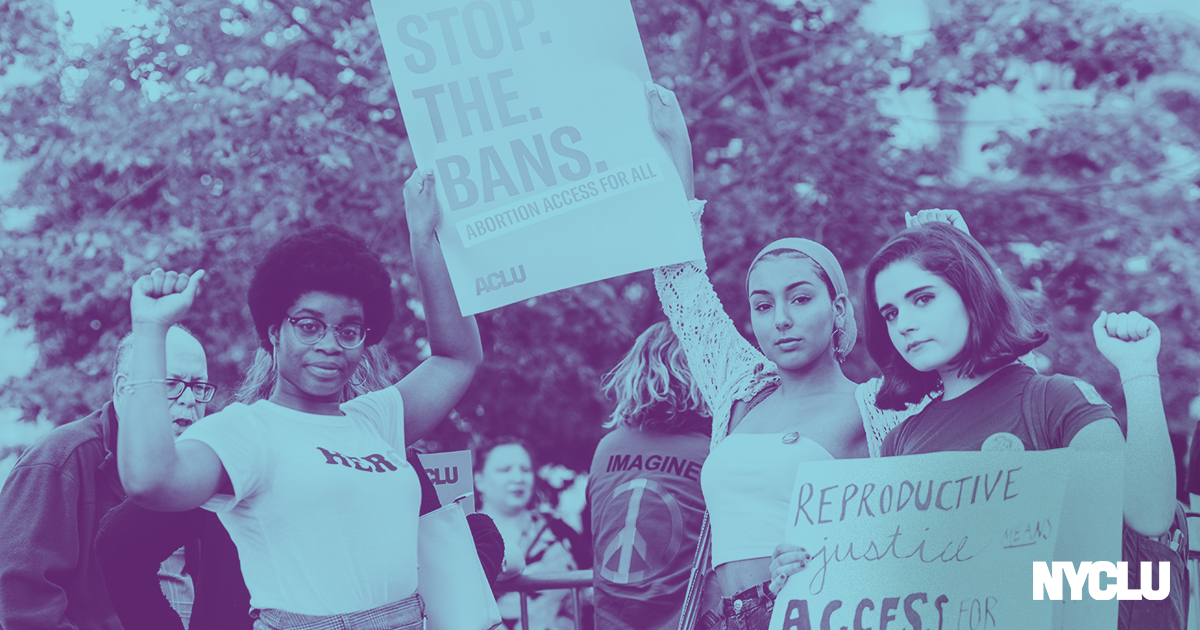Know Your Rights: Students in Higher Education & the First Amendment
Civil Liberties Union

As states across the country ban and eliminate access to abortion, we in New York are working to make sure all people can get the care they need. Prohibiting abortion does not remove the need for abortion. Instead, it delays care or makes abortion impossible to access — especially for those who are struggling to make ends meet. Reproductive health care ensures that people can plan their futures and participate equally in our society. This includes birth control and abortion, as well as prenatal and postpartum care. Inside, you will find information on your abortion rights under New York law, and resources for those seeking care.
This KYR is not a replacement for legal advice.
Once someone has decided to end their pregnancy, they deserve safe and affordable abortion care — as early as possible and as late as necessary.
In June 2022, the Supreme Court overturned Roe v. Wade, ending the federal constitutional right to abortion. In response, many states have banned or severely limited abortion care. New York law, however, protects access to abortion care.
The law allows people to get care when they need it throughout pregnancy. Health care practitioners may provide abortion care 24 weeks from the beginning of pregnancy without requiring a reason from the patient. The New York State Department of Health (DOH), defines pregnancy as beginning after the implantation of a fertilized egg. This means that under the law, 24 weeks from the beginning of pregnancy would be 27-28 weeks from a person’s last menstrual period.
After that point, they may provide abortion care in cases where a patient’s health or life is at risk, or when the fetus is non-viable. The DOH defines when a person’s “health is at risk” broadly to include any factor that impacts a person’s well-being.
Not everyone is able to access an abortion earlier in their pregnancy. Many people are initially delayed because they did not know they were pregnant. There may be a change in their life circumstances or discovery of a fetal or maternal health condition. Financial hurdles and legal barriers, including the need to travel for care, further delay abortion access.
Under New York law, doctors and Advanced Practice Clinicians (APCs) can provide abortion care that is within their scope of practice. APCs include physician assistants, nurse practitioners, and licensed midwives. Care by APCs has been shown to be safe and effective.
Various methods of abortion are available. They depend upon the stage of pregnancy, the patient’s preferences, and any medical indications. Abortion care is safe and has low complication rates. Patients should talk to their providers about which type of abortion care is best for them.
Medical care is typically confidential and New York law specifically protects the medical records of abortion patients. However, your medical record may be shared between your health care providers. If you have concerns about your medical record being shared, please talk with your health care provider.
If you are traveling from another state, there may be more to consider when it comes to protecting information about your abortion. We recommend you do more reading about digital abortion privacy at at Digital Defense Fund.
New York requires that both public and most private health insurance cover abortion care. New York law requires most private insurance to cover abortion care without a copayment or a deductible and New York has long covered abortion under Medicaid. A person may still need financial support to pay for travel, a place to stay, or, if their insurance does not cover abortion, the care itself. Logistical support groups, such as the Brigid Alliance, or abortion funds, such as the New York Abortion Access Fund, are available to provide assistance. Abortion providers will often be able to help a patient work with these organizations as well.
A minor who can provide informed consent (i.e. they understand the risks and benefits of the care) can consent to confidential abortion care.
People who need abortion are targeted with misinformation both online and at anti-abortion fake clinics. People should be sure to get information from reputable sources.
WHO (World Health Organization)
Office of the New York State Attorney General